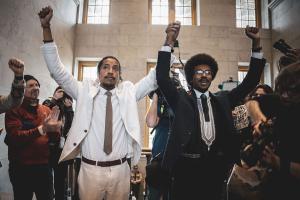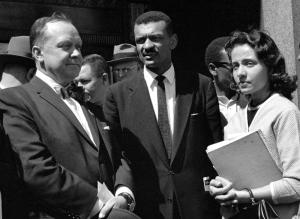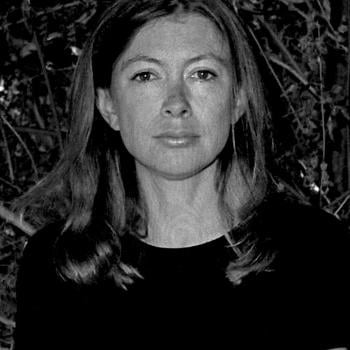Along with lamentations, the horrific recent shooting at the Covenant School also created a crises of democracy in the Tennessee Legislature. Scores of students marched to the Capitol in downtown Nashville to protest government inaction in the face of mass school shootings, creating a moral and media spectacle. State Representatives Jones, Pearson and Johnson participated in protests, which, under dubious invocations of decorum, got Jones and Pearson, who are Black, expelled. Though they were re-elected and readmitted by their constituents, the debacle has set off new debates about the state of democracy in America.

Andrea Morales for MLK50, MS Free Press
But anti-Black and anti-democratic actions to protect special interests, white supremacy and capital are, of course, not new. Neither are their resistors.
Last week, my friend Anthony Siracusa and I wrote about the legacies of civil rights protest in the city of Nashville, how in the early 1960s, the Rev. James Lawson trained scores of students in nonviolent direct action. These young people, in their love, in their unity, in their persistence, embodied the moral question at the heart of the Black freedom struggle. “Do you think segregation is right,” Diane Nash asked Mayor Ben West, “as a man?”

Diane Nash reminds us, as I wrote last month, that the language of policy or partisanship is not adequate for the moment. We must unabashedly invoke the language of morality. Of religion. We must make the choices plain. Admittedly, that is difficult when so much of our political speech is spiritually tinctured hyperbole.
And yet, those who care, still, about goodness and justice and mercy, should not abandon the effort. We also must continue to root ourselves in history. These political fights are not, as much as pundits insist, only about four year cycles, about demographic maps in Georgia or Wisconsin, about Supreme Court seats. The struggle is long.
Representative Jones knows this. As he put it: In the South, “There’s a history of slavery, brutality, yes, but there’s also a history of resistance…[a] rich history of liberation and subversiveness.”After our Washington Post piece came out, I learned that Representative Jones, in fact, talks often with Diane Nash. In an interview with Sojourners’ Mitchell Atencio he explained: “One of my closest mentors, who I’ve talked to for years and throughout this process, is Diane Nash, who I believe is a representative of faith — what she calls “agapeic energy,” this love force that is used to challenge injustice and harm. She’s been one of my dear elders and teachers who’s really guided me throughout this process.”
It’s not just that he, and others like him, are drawing inspiration from the civil rights struggle; it’s the same struggle. Justin Jones was expelled, just as Julian Bond was. Justin Jones goes to Vanderbilt Divinity School, just like James Lawson. Diane Nash is alive. She’s on the phone.
Together, drawing upon the language of morality and “agapeic energy,” remembering the long history of struggle, we keep on.













